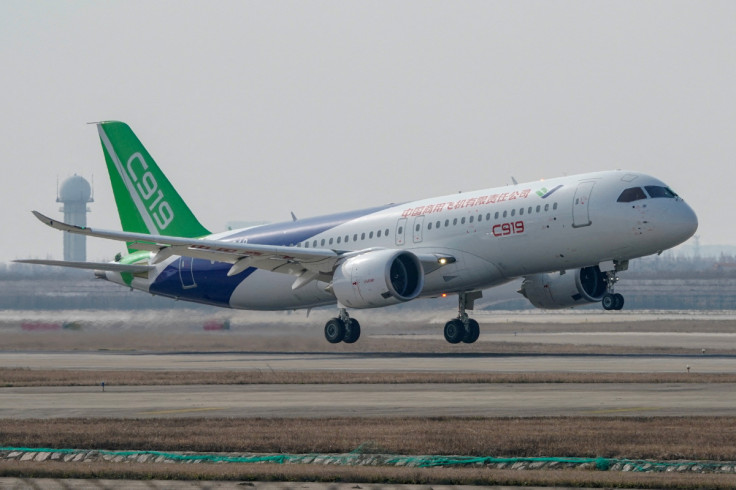China Certifies C919 Jet To Compete With Airbus And Boeing -photos

China held a ceremony on Thursday to certify its C919 narrowbody passenger jet, photos on social media showed, representing a major milestone in the country's ambitions to challenge Airbus and Boeing in commercial aerospace.
The plane, produced by state-owned manufacturer Commercial Aircraft Corp of China (COMAC), had been widely expected to be certified by the end of the month after two aircraft flew to Beijing on Sept. 13. A sign in one of the photos said "C919 aircraft type certificate issuance ceremony" in Chinese.
COMAC did not respond immediately to a request for comment.
The C919, launched 14 years ago and designed to carry up to 168 passengers, will compete against the popular Airbus A320neo and Boeing 737 MAX families in the world's second-biggest aviation market as China looks to boost its technological self-reliance amid trade tensions.
Although the plane is assembled in China, it relies heavily on Western components, including engines and avionics, from companies including GE, Safran and Honeywell International.
Tough U.S. export licensing rules have led to delays in sourcing parts and remain a key risk to ramped up production until China replaces foreign engines and components with homegrown technology.
Richard Aboulafia, U.S.-based managing director of AeroDynamic Advisory, said the plane seems like a relic of a bygone era of increasing integration between China and the West.
"Thus, we have an aircraft that is only superficially Chinese but is actually powered by Western technologies and systems," he said. "Turning it into a genuine Chinese aircraft would take well over a decade and many billions of dollars."
The type of certificate granted on Thursday means it can be delivered to the first customer, China Eastern Airlines Corp Ltd, though local media have reported the plane is unlikely to enter commercial service with passengers until next year.
The C919 has never made an appearance at the country's premier aviation event, Airshow China and it is unclear whether it will be on display or flown at the show in November.
COMAC will also need a separate production certificate before it can ramp up mass production of the plane, meaning its impact on the global aircraft market could remain limited given Airbus and Boeing produce dozens of narrowbodies a month.
"The C919 will gradually begin to replace single-aisle aircraft made by Boeing and Airbus," in China, a research note by Huaxi Securities said this month. "In the next 20 years, China's demand for narrowbody passenger aircraft like the C919 will be on average 300 per year."
The C919's regional jet predecessor, the ARJ21, faced a 2.5-year gap between obtaining the type certificate and the production certificate, slowing production. That contrasts with the West, where both certificates are typically granted around the same time.
FOREIGN CERTIFICATION
Like the ARJ21, the C919 lacks certification validation by U.S. and European regulators, limiting flights to the domestic market and possibly countries with close ties to China.
The European Union Aviation Safety Agency (EASA) has been working for years on a certification validation process on the C919 with COMAC in parallel to CAAC's work, an EASA spokesperson said.
"We cannot comment on the date when this validation would be completed," the spokesperson said.
The U.S. Federal Aviation Administration did not respond to a request for comment on a potential C919 certification validation.
There have been 815 orders for the C919 from 28 customers, according to COMAC's website. But China Eastern is the only customer that has announced a firm delivery schedule and it expects to receive only four next year.
In the meantime, the Boeing 737 MAX has yet to return to commercial service in China, having been grounded since March 2019 after two fatal crashes.
However, three months ago major Chinese airlines placed an order for nearly 300 Airbus A320neo family planes, showing the country plans to continue imports for some time.
Aboulafia said if China did decide to halt Western aircraft imports, the United States and allied countries could kill the C919 for years by prohibiting component exports.
"Try building an aircraft without an engine, or avionics," he said. "It would just be a metal shell."
© Copyright Thomson Reuters 2024. All rights reserved.





















